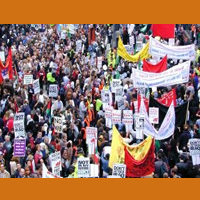ECONOMICS AND SUSTAINABLE DEVELOPMENT: FOUR BOOKS
Three Books On How Economics Impedes Sustainable Development
The first three books discuss the faults of mainstream economics and how these block the development of a prosperous, ecologically sustainable and socially equitable society:
- Crisis, Economics and the Emperor’s Clothes. Why economics fails to deal with society’s economic, environmental and social problems – and what to do about it. Download 300 pages, 2012.
- The Common Sense Manifesto. The Fourth Way: how a new economics can help create a prosperous, socially inclusive and environmentally sustainable society. Download 70 pages, 2012.
- Economics and the Emperor’s Clothes. Shortcomings of economics as a science, the consequences for society, and what to do about it. Publication planned in the course of 2018.
These three books aim to contribute to the development of an alternative for today’s mainstream economics. They argue that today’s mainstream economics is failed science. Aspiring to be a “hard” science like physics, it is in fact a pseudoscience based on precepts that are at odds with reality. Its basic methodology, consisting of mathematical modeling using unrealistic assumptions, creates a distorted image of the economy and therefore fails to explain and especially predict economic phenomena with any measure of accuracy.
Mainstream economics centers around dogmas untested against reality but accepted as timeless universal “truths”. This makes economics look like a faith more than a science. Those “truths” are handily used and abused by powerful interests in society. Because they determine economic, fiscal and monetary policy they also shape overall government policy, blocking society from taking the measures needed to address its key environmental, social and economic challenges.
Thus mainstream economics has become the single most important obstacle to the sustainable development of society. Removing this obstacle requires the transformation of economics from today’s pseudo “hard” science into real science: a social science that will increase our understanding of how the economy really works. This better understanding and resulting policy prescriptions can then help us create a better society: environmentally sustainable, socially equitable, with a decent standard of living and prosperity for all.
About the books Crisis, Economics and the Emperor’s Clothes and The Common Sense Manifesto
Both these books, published in 2012, relate the flaws of economics to the financial and economic crisis that erupted in 2008 with the fall of Lehman Brothers bank. The books point out that not only the crisis but also the economic growth occurred since is due to new and increasing indebtedness, paving the way for the next crisis. They also explain how mainstream economic doctrine blocks putting the global economy on a path of more sustainable growth. And they argue that, because of the cost of the crisis and the restraints imposed by economic dogma, governments lack the resources for making the investments needed for sustainable development: the process leading to an ecologically sustainable and socially just economy and society.
A summary of Crisis, Economics and the Emperor’s Clothes and The Common Sense Manifesto in fourteen propositions can be found here.
Those interested in a more elaborated critique of economics, a more detailed outline of a new economics, and more worked out ideas on economic and financial policy are recommended to read the book Crisis, Economics and the Emperor’s Clothes.
More about Crisis, Economics, and the Emperor’s Clothes here.
Download Crisis, Economics, and The Emperor’s Clothes free of charge as a pdf file here.
A printed version of Crisis, Economics, and The Emperor’s Clothes is available at Lulu.com (http://www.lulu.com/shop/frans-doorman/crisis-economics-and-the-emperors-clothes/paperback/product-21140551.html), or at Amazon or Barns & Noble.
Those interested in a shorter read and a first outline of the Fourth Way are advised to read The Common Sense Manifesto. Though it does not analyze the shortcomings of mainstream economics in detail it does discuss the consequences of and remedies for those shortcomings and an approach to create a sustainable society while solving the economic crisis.
More about The Common Sense Manifesto here.
Download The Common Sense Manifesto in pdf form here (free).
A printed version of The Common Sense Manifesto is available at Lulu.com (http://www.lulu.com/shop/frans-doorman/the-common-sense-manifesto/paperback/product-21140665.html) or at Amazon or Barns & Noble.
About the book Economics, Money and Sustainable Development.
Economics, Money and Sustainable Development. The failure of economics, the consequences for society, and how we can do better is an abbreviated and updated version of the 2012 book Crisis, Economics and the Emperor’s Clothes. In addition to highlighting the main shortcomings of economics as a science it pays particular attention to our monetary system, outlining the need for monetary reform as a precondition for sustainable development. In addition, it gives an outline of a new economics and the contribution such a new economics would make to first, a better understanding of how the economy really works and secondly, the transition to a new monetary system as an essential step towards a more stable economy, aimed at creating more wellbeing for all and an ecologically sustainable society.
Crisis, Economics and the Emperor’s Clothes remains the book of choice for those interested in a more detailed analysis of the shortcomings of economic science, whereas Economics, Money and Sustainable Development is aimed especially at those interested in the elaboration of the relationship between (the dogmas of) economic science, our monetary system and sustainable development. The Common Sense Manifesto remains the designated book for those wanting to start with a comprehensive summary of the relationship between economics and sustainable development.
Publication of Economics, Money and Sustainable Development is scheduled in the course of 2018.
For more information about Economics, Money and Sustainable Development click here.
For a summary of the contents in 12 propositions click here.
A Book On Enterprise – Private And Public
The fourth book discusses forms of enterprise that would better align the interests of private enterprise with the public interest.
- The Primacy of Private. Private enterprise, public service, and markets: alternatives for private, profit-oriented production (2018).
This book aims to develop new thinking on economic development. It assesses whether, as is generally assumed, an economy based on private, profit-oriented enterprise serves society best, or whether there might be alternatives that align the benefits of private enterprise with the public interest.
This book is still under elaboration; for more information click here.
For a summary of the contents in 20 propositions click here.



